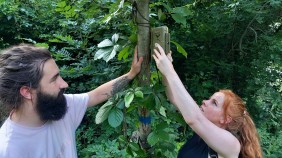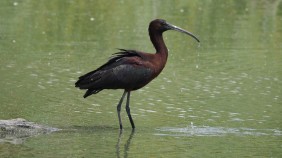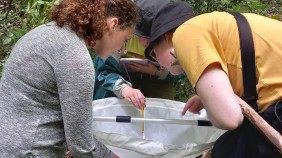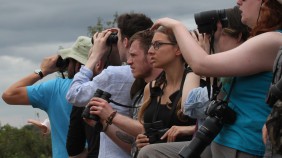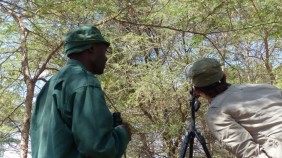
Biology and conservation field trips
Visit field sites across the world to gain valuable practical experience.
Learning in the field
The best way to learn about life, whatever the species, is to experience it first-hand. That’s why, in addition to our outstanding teaching laboratories, our biology and conservation masters degrees offer the opportunity for overseas fieldwork.
Our field trip unit could take you to visit some of the most famous wildlife sites in the world, from the Ngorongoro Crater to the Serengeti National Park in Tanzania. Your masters-level dissertation could also involve international travel for gathering data and conducting research.
With our strong links to conservation bodies, research organisations, zoos and aquariums around the world, we can help you step out of the classroom to discover different environments, cultures, and conservation challenges.
Please note that all overseas field trips are subject to international travel restrictions and availability. The University follows the latest government guidance and if required, the overseas trip may be replaced with a UK alternative.
Current field trips
Duration: 15 days including travel
Available on: MSc African Wildlife Ecology and Conservation, MSc Animal Behaviour and Evolution, MSc Global Conservation Biology, MSc Zoo Conservation Biology
This field trip is run in collaboration with the College of African Wildlife Management and we visit some of the most famous and spectacular wildlife sites in the world.
You’ll have the opportunity to gain experience in population monitoring, territoriality and mate choice, conservation management, species identification and wildlife ecology. You’ll also be able to carry out small group research projects on mammals, birds, reptiles and invertebrates.
You’ll sometimes be working on foot with local rangers, other times from the back of a truck. The trip isn’t for the faint-hearted as it can, at times, be uncomfortable and dusty. Although we camp within protected areas, the sites aren’t fenced so don’t be surprised by a visit from local wildlife. As well as the experience of working with a group of UK and Tanzanian conservation biologists, you will also see first-hand the challenges of combining biodiversity conservation with human development.
Duration: 10 days including travel
Available on: MSc Animal Behaviour and Evolution, MSc Global Conservation Biology, MSc Zoo Conservation Biology
This field trip is run in collaboration with Merops and takes place around Chateau de Fraissinet in the foothills of the Cevennes in Southern France. This is a unique opportunity to visit the region’s famous national parks, the wetlands of the Camargue and the beautiful mountains of La Combe.
You’ll gain valuable experience conducting research on local wildlife — including beavers, bats and boar — using a variety of techniques and answering questions relevant to animal behaviour, population monitoring and habitat management. Crucially, you’ll develop your skills in designing, conducting and disseminating research in small groups. Expect great food, beautiful scenery and unique fieldwork opportunities.

Duration: Eight days
Available on: MSc Zoo Conservation Biology
Thanks to our well-established partnership with Chester Zoo, our students are able to learn directly from those that know best — in one of the UK’s biggest zoos.
On this week-long field trip, you’ll learn the ins and outs of zoo life. From balancing visitor experience with animal welfare, to ex-situ conservation, wildlife research and zoo management. Our students benefit from this unique opportunity to get behind the scenes.
You’ll gain vital employability skills that will help you stand out against the crowd. The trip covers key issues such as:
- How to use a stud book
- Licensing for the transportation of animals
- How to record animal behaviour
- Enclosure design
- Camera trapping
- Ethics reporting
- Public experience and education
Frequently asked questions
Who can attend field trips?
Field trips are available to students who are studying certain courses. Please refer to individual course pages for further information.
Do I have to pay for field trips?
Field trips in Europe and Turkey are included in your course fees. Overseas field trips to Tanzania incur an additional cost of £2,500. All other specialist field trips are optional and require a fee to cover the cost of:
- accommodation
- meals
- transport
There may be additional costs for all overseas trips — including trips in Europe and Turkey. This includes the costs associated with getting travel visas.
The cost of each trip varies from year to year. The prices for 2024 field trips are not yet available.
Are there other units that I have to take as prerequisites for field trips?
None of the field trips require you to have taken specific units beforehand, but certain units are only open to certain degree courses. Please refer to individual course pages.
Do I need to bring any specialist equipment?
We’ll provide relevant equipment and tools for use during the field trips. If specific personal equipment is needed, we’ll inform you prior to travel.
Will I be insured?
You’ll be covered by our travel insurance, as long as you’ve signed up for this on time, before starting your course. We’ll notify you when and how you need to do this.
How will I be assessed?
We require you to submit written coursework and present the findings of your field research to course staff and the rest of the group. This varies between field trips and level of study but will be explained to you at the beginning of the unit.






